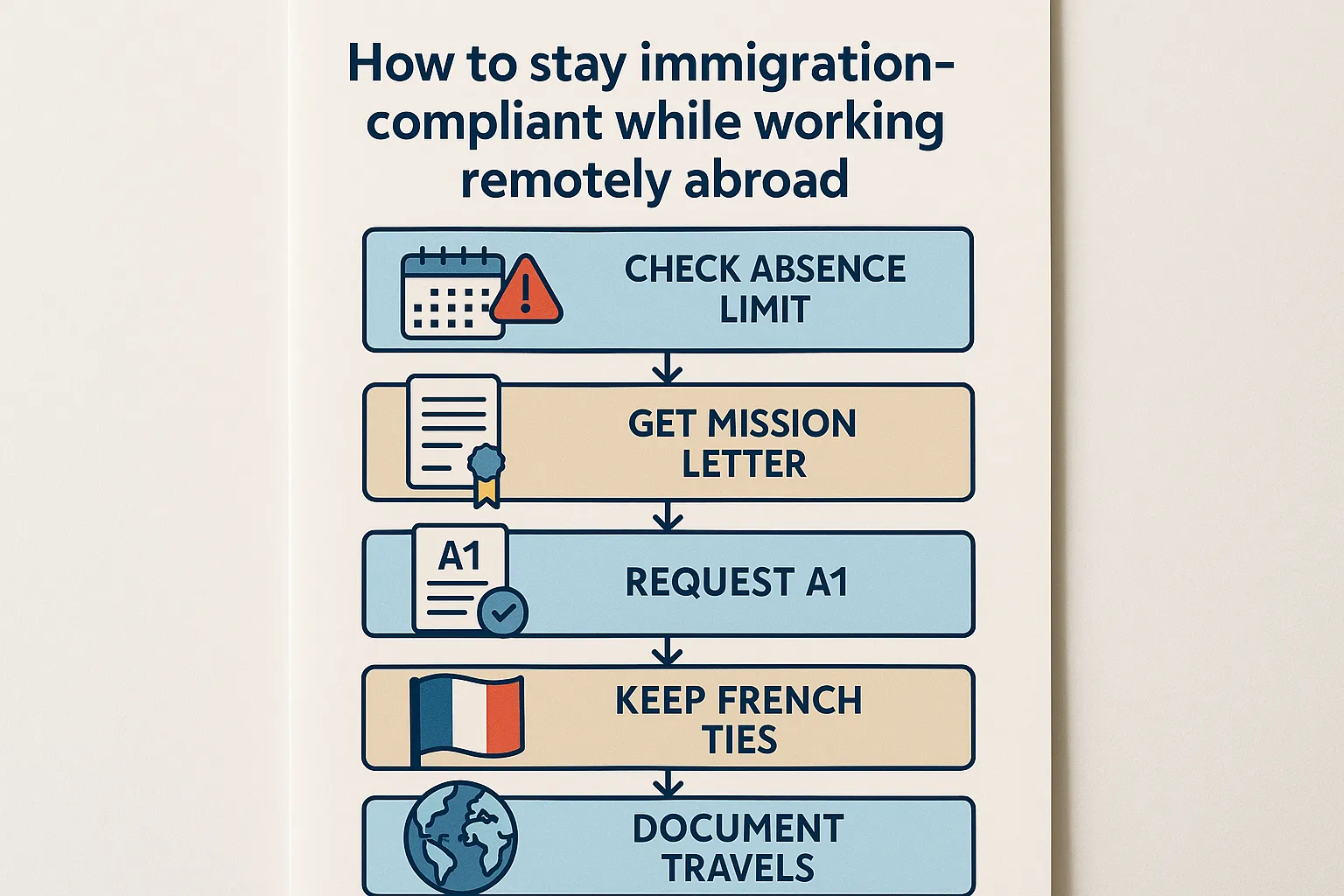Remote Work From Abroad While Holding a French Contract: Legal Impact on Visas

Working from a beach café in Lisbon or visiting family in Delhi while keeping your French salary sounds like the best of both worlds—until your next prefecture appointment. Since 2022 ImmiFrance consultants have seen a surge in clients whose residence-permit renewals were jeopardised because they spent months teleworking outside France. Understanding how French immigration law treats remote work from abroad is essential before you book that long stay flight.
The Core Rule: Presence in France Still Matters
Under Article L.312-2 of the CESEDA, most temporary residence permits automatically lapse if the holder spends more than six consecutive months outside France. Long-term resident cards (10-year « résident de longue durée-UE ») offer a broader 3-year absence allowance, while the four-year « Passeport Talent » category sits in-between with a 12-month cap. If your card lapses, you must re-apply from scratch at a consulate—even if you have an ongoing French work contract.
| Permit Type | Maximum Continuous Absence Allowed | Legal Reference |
|---|---|---|
| Standard one-year salarié, ICT, student, VPF | 6 months | CESEDA L.312-2-I |
| Passeport Talent (4 years) | 12 months | CESEDA L.313-23-III |
| Long-term resident – EU (10 years) | 3 years | CESEDA L.426-1 |
| Naturalisation procedure (before decree) | Discretionary but frequent-presence required | Civil Code art. 21-17 |
Key takeaway: Remote work abroad does not stop the absence clock. The prefecture will look at passport stamps, airline records and social-security contributions when deciding whether you remained “habitually resident” in France.
Remote Work vs. Posting vs. Secondment
French labour law distinguishes three common scenarios:
- Occasional teletravail depuis l’étranger (informal remote work abroad). The employee chooses to spend a few weeks or months in another country without an official mission letter.
- Détachement / posting within the EU under Regulation (EC) 883/2004. The employer files for an A1 certificate; the employee keeps paying French social security, is still considered based in France and usually receives daily allowances.
- Expatriation or local contract. The employment relationship moves abroad; French social security and labour law cease to apply.
Only the first two keep you on a French contract, but immigration treatment differs:
- A formal posting often counts as “mission” time and does not break residence because the employer orders the assignment. Keep the mission order and A1 certificate to present at renewal.
- Pure “work-from-anywhere” arrangements are treated like personal travel. Beyond the six-month threshold your card can lapse.
ImmiFrance tip: Ask HR for a mission order—even if nominal—before leaving. Prefectures accept it as proof that your stay abroad was professional, not migratory.
Evidence the Prefecture Expects at Renewal
Many prefectures now request documents proving an applicant’s principal residence in France. Prepare to supply:
- A passport copy with all entry-exit stamps and boarding passes.
- French pay slips for every month since the last card was issued.
- Recent EDF/GDF or rental bills showing you still occupy a French address.
- Sworn statement from your employer confirming that remote work periods were temporary postings.
Failure to demonstrate habitual residence leads to two typical outcomes: refusal to renew with an Obligation de Quitter le Territoire Français (OQTF) or renewal granted for a shorter period (often six months).
See our in-depth guide on public-order refusals and OQTF appeals for next steps if this happens.
Social-Security Red Flags
Working outside France while on a French contract may trigger double social-charge exposure if not classified as an official posting. Outside the EU, you risk owing contributions in the host country while URSSAF continues to levy French charges. Prefectures increasingly cross-check URSSAF and tax records; inconsistent declarations can cast doubt on your “integration” and jeopardise naturalisation applications.
Useful external resources:
- French Ministry of Labour FAQ on teletravail à l’étranger (updated February 2025)
- URSSAF international guide to A1 certificates
Tax Residence and the 183-Day Myth
Many employees assume the OECD 183-day rule guarantees French tax residence. In reality, tax and immigration rules are distinct:
- Spending 120 days in Colombia may keep you French-tax-resident, but immigration officers only count physical presence in France.
- Conversely, a posted worker in Spain for nine months with a mission order may remain resident for immigration even if becoming Spanish-tax-resident.
Always verify double-tax treaties and notify the French tax office (Service des impôts des particuliers non-résidents) if you cross 183 days abroad.
Planning a Compliant Remote-Work Period
- Set a calendar: Count every day abroad—including weekends—toward the six-month limit.
- Secure documents before departure:
- Mission letter spelling out dates, location, and confirmation that your salary remains paid in France.
- If in the EU/EEA, the employer should request an A1 certificate via Net-entreprises > « Attestation Employeur détachement/activité multistate ».
- Maintain strong French ties:
- Keep your French apartment or at least a lease; avoid subletting without written permission.
- Continue French phone and utilities; bills serve as residence proof.
- Return for key milestones: Plan to be physically in France for:
- Annual medical check-ups (helpful for naturalisation files)
- Carte de séjour fingerprint appointments (some prefectures cancel if you are abroad)
- Income-tax filing season to gather French payslips and attestations.
- Keep travel evidence: Save boarding passes and e-tickets—even digital ones vanish quicker than you think.

Special Cases
Holders of the new 2025 Passeport Talent Monde
The 2025 Immigration & Integration Act introduced a more flexible four-year card for high-skilled digital nomads. Although the 12-month absence rule applies, the law allows a once-per-permit extension if the employer certifies continued French social-security coverage. File the extension request on ANEF at least two months before crossing the 12-month mark.
Students on VLS-TS
A student visa validated online (VLS-TS Étudiant) lapses after a continuous absence of more than six months. Universities also require physical presence for ECTS validation. Remote internship abroad counts as absence unless credited by the French institution.
Workers Awaiting Naturalisation
During the 18-month processing window for a citizenship file, long absences can trigger a request for updated « justificatifs de résidence ». Maintain monthly evidence of presence (bank withdrawals, Navigo statements) and keep absences under six months.
Common Myths Debunked
- “My employer is fine with it, so immigration is fine too.” Employment approval does not override CESEDA absence rules.
- “I can re-enter France every 179 days to reset the clock.” The six-month counter is continuous; same-day returns do not reset it.
- “Prefectures don’t look at passport stamps anymore.” Since 2024 EES roll-out, border-crossing data is recorded automatically and available to prefectures.
What If You Already Exceeded Six Months?
- Return to France immediately and gather evidence showing the trip was employer-mandated.
- Consult a lawyer to assess whether the absence can be characterised as détachement.
- Prepare a detailed cover letter for renewal explaining reasons, attaching mission orders, A1 certificates, and proof of social-security payments.
- If renewal is refused, see our guides on contesting an OQTF and on re-entry visa options.
Step-by-Step Departure Checklist
- Confirm absence allowance for your permit category.
- Obtain mission letter or posting decision.
- Request A1 certificate (EU/EEA/Switzerland only).
- Update travel insurance to include long stays abroad.
- Forward French post or set digital mailbox for prefecture letters.
- Back up all payslips and utility bills before leaving.
- Add six-month reminder in your calendar to reassess stay.

Final Thoughts
Remote work abroad offers freedom, but French immigration rules have not fully caught up with borderless laptops. Exceeding authorised absence limits can quietly void your residence permit long before you reach the airport. Careful planning, the right documentation, and proactive dialogue with your employer keep your French contract—and your legal status—intact.
Need personalised guidance? Book a 30-minute strategy call with an ImmiFrance adviser to audit your travel calendar, draft mission letters, and safeguard your next renewal. Our network of immigration lawyers can also step in if you already face a refusal or OQTF.
Stay mobile, but stay legal.
